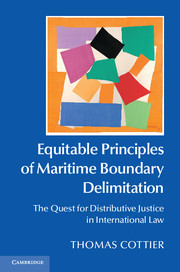 Equitable Principles of Maritime Boundary Delimitation
Equitable Principles of Maritime Boundary Delimitation Book contents
- Frontmatter
- Dedication
- Contents
- List of tables
- List of maps
- Preface
- Acknowledgements
- Table of cases
- Table of treaties and instruments
- Equity revisited: an introduction
- PART I Context: the enclosure of the seas
- PART II The new boundaries
- 4 Approaches to delimitation
- 5 State practice
- 6 Judicial and conciliatory settlements
- 7 An assessment of customary law
- PART III Delimitation based on equity
- Appendix I Maritime boundary agreements 1942–1992
- Appendix II General maps
- Bibliography
- Index
5 - State practice
from PART II - The new boundaries
Published online by Cambridge University Press: 05 May 2015
- Frontmatter
- Dedication
- Contents
- List of tables
- List of maps
- Preface
- Acknowledgements
- Table of cases
- Table of treaties and instruments
- Equity revisited: an introduction
- PART I Context: the enclosure of the seas
- PART II The new boundaries
- 4 Approaches to delimitation
- 5 State practice
- 6 Judicial and conciliatory settlements
- 7 An assessment of customary law
- PART III Delimitation based on equity
- Appendix I Maritime boundary agreements 1942–1992
- Appendix II General maps
- Bibliography
- Index
Summary
Unilateral acts (proclamations and legislation)
In the process of claims and responses, unilateral practice and acts of states are of importance in assessing the status of methods of delimitation. This chapter analyses the period from 1942 to 1992, comprehensively covering the formative stage of the continental shelf doctrine and of the EEZ. This prepares the ground for assessing state practice and customary international law in Chapter 7, taking into account the record of judicial settlement discussed in Chapter 6.
A. Continental shelf
Unilateral practice and acts reflect two of the three models discussed prior to UNCLOS III. While many documents do not explicitly address the principles and methods of delimitation applied, others refer to the models of equitable principles and the concept of equidistance–special circumstances, albeit with different weight and significance. In no case was the concept of the legal vacuum (ex aequo et bono) found to be formally applied.
(i) Given the early uncertainty of the law on maritime boundary delimitation during the 1950s, it is hardly surprising that most of the post World War II proclamations on the shelf did not address the issue of boundary delimitation at all, or merely referred to settlement by agreement. They did not indicate any standards of delimitation. The 1964 declaration of the Federal Republic of Germany on the continental shelf is an example it point. It refers to international agreement and thus implicitly to general international law to the extent that boundaries will be settled in court.
(ii) Several states, although not many, explicitly referred to equidistance or the median line. Iraq is an example in point. Norway claimed rights of exploration and exploitation of the soil and the subsoil ‘within as well as outside the maritime boundaries otherwise applicable, but not beyond the median line in relation to other States’. Another form of reference to the median line was used in terms of a residual rule by Italy to be applied pending agreement. […]
- Type
- Chapter
- Information
- Equitable Principles of Maritime Boundary DelimitationThe Quest for Distributive Justice in International Law, pp. 236 - 270Publisher: Cambridge University PressPrint publication year: 2015


